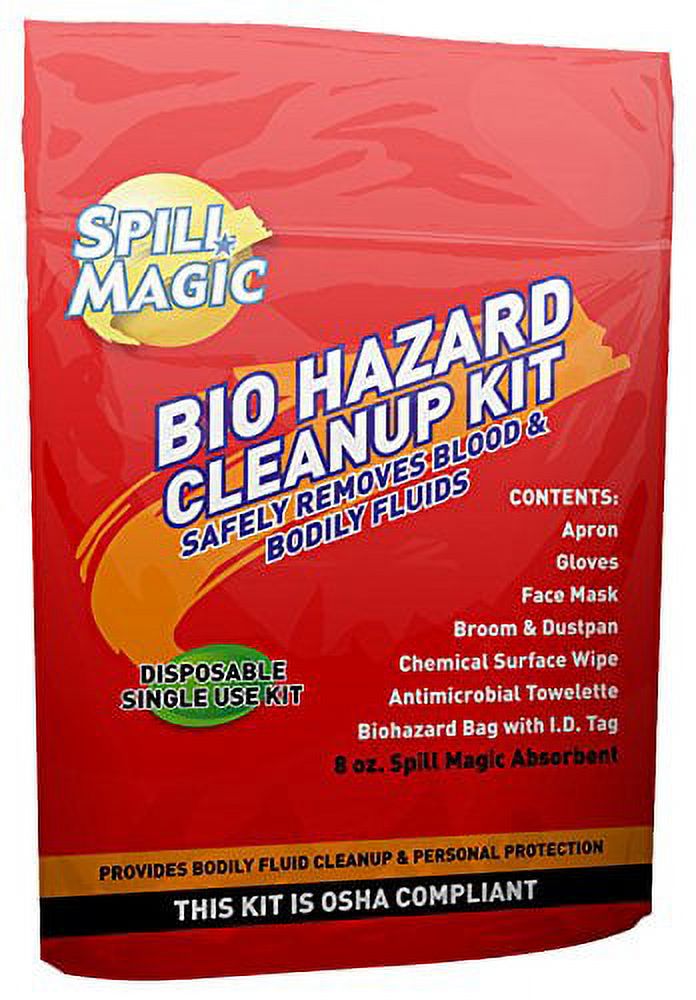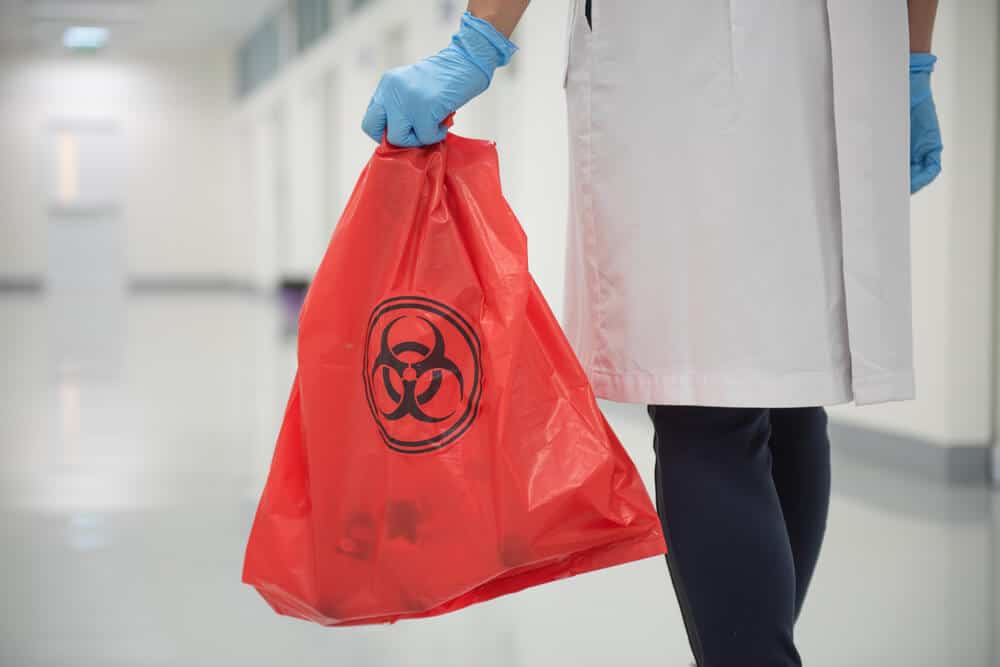Specialist Blood Cleanup: Making Sure Safe and Thorough Decontamination
Specialist Blood Cleanup: Making Sure Safe and Thorough Decontamination
Blog Article
Professional Biohazard Clean-up for Criminal Activity Scenes, Injury Incidents, and Contaminated Rooms
In the realm of professional biohazard cleanup, precise focus to information and adherence to safety procedures are paramount. When confronted with the results of a criminal offense scene, injury occurrence, or any contaminated space, the importance of appropriate clean-up can not be underrated. The risks and intricacies linked with biohazards require specialized understanding and competence to ensure effective remediation. As we look into the complexities of biohazard cleanup for these sensitive environments, a deeper understanding of the difficulties and important procedures involved will arise, dropping light on the essential role of expert clean-up services in recovering safety and tranquility of mind.

Importance of Biohazard Clean-up
Biohazard cleanup following crime scenes and injury occurrences is critical for making certain the security of individuals and the environment. When these incidents happen, they often leave behind a selection of biohazards such as blood, bodily fluids, and other possibly infectious products. These materials can harbor harmful microorganisms like viruses and germs, posturing major health risks otherwise properly cleansed and sanitized.
Professional biohazard cleanup solutions are educated to manage these harmful materials securely and efficiently. They have the needed devices, such as individual safety equipment and specialized cleansing agents, to extensively decontaminate the affected areas. By delegating the clean-up to qualified experts, people can stay clear of exposure to unsafe virus and prevent the spread of infectious diseases.
Additionally, proper biohazard cleanup is essential for securing the atmosphere. Incorrect disposal of biohazardous products can infect dirt, water sources, and air, positioning a threat to wildlife and the ecological community. By complying with strict cleaning methods, specialists can ensure that biohazards are securely gotten rid of and thrown away based on guidelines, decreasing the danger of ecological contamination.
Kinds Of Biohazards Encountered
Numerous hazardous materials frequently run into in criminal offense scenes and injury occurrences present significant health risks if not dealt with correctly. Blood and physical fluids are amongst the most usual biohazards found in these situations.
An additional kind of biohazard usually come across is sharp items like needles, busted glass, and various other items that can create injuries and send infections. Chemical threats are also an issue, as criminal offense scenes might include materials like tear gas, pepper spray, or drug production products that call for specific handling and disposal treatments to stop more damage.
Moreover, mold and mildew and microorganisms development can happen in spaces where decomposition or extended direct exposure to dampness has occurred. These microbes can launch toxic substances and irritants into the air, posturing breathing risks to those exposed. In general, biohazard cleanup experts must be skilled and well-equipped to properly take care of these different kinds of unsafe products to ensure the safety of themselves and others.
Tools and Safety Equipment
When addressing the critical task of dealing with biohazards come across in crime scenes and trauma incidents, the usage of proper tools and safety gear is paramount to making sure the security of people included in the cleaning procedure. Individual safety equipment (PPE) such as handwear covers, coveralls, masks, and safety glasses are important to avoid direct call with potentially unsafe materials. Respirators are crucial when handling biohazards that may become airborne, securing workers from breathing in harmful fragments. Specialized cleansing tools like biohazard anti-bacterials, sharps, and bags containers are needed for the risk-free collection and disposal of infected materials. Furthermore, sturdy equipment such as industrial-grade cleaner, foggers, and ozone generators might be called for to thoroughly sanitize the damaged location. Making certain that all equipment is appropriately kept, routinely inspected, and utilized according to safety standards is important in lessening the danger of direct exposure to biohazards during clean-up procedures.
Clean-up Refine and Strategies
Efficient and comprehensive cleaning of biohazardous materials from criminal offense scenes and injury events requires precise attention to detail and adherence to rigorous security protocols. The cleaning process normally includes several essential actions. Originally, the area must be examined to establish the degree of contamination and the ideal cleaning techniques required. Next, all site here biohazardous products, including blood, bodily liquids, and cells residues, need to be carefully gotten rid of and taken care of according to regional laws.
Complying with the elimination of biohazardous materials, the damaged area undertakes a comprehensive cleaning and disinfection procedure. This step involves using specialized cleansing agents and equipment to make sure that all traces of contamination are eradicated. After cleaning, the location undergoes strenuous screening to validate that it is risk-free and complimentary of any staying biohazards.

Decontamination and Disposal Treatments
To make certain extensive purification and appropriate disposal of biohazardous materials, following the meticulous cleaning procedure, details treatments must be carefully adhered to with strict adherence to safety procedures. Decontamination entails the removal or neutralization of contaminants to reduce the threat of direct exposure and spread of unsafe substances. This procedure normally includes cleansing, decontaminating, and sanitizing the damaged location making use of customized devices and EPA-approved chemicals.
When decontamination is finished, proper disposal of biohazardous products is critical to stop further contamination or injury. Biohazardous waste, such as blood-soaked materials or physical fluids, need to be meticulously gathered, packaged, and labeled according to regulative standards. ATP testing. These products are after that transported to certified facilities for disposal via appropriate networks, making certain compliance with local, state, and federal guidelines

Verdict
In verdict, expert biohazard clean-up is vital for making certain the reliable and safe removal of dangerous materials from criminal activity scenes, injury incidents, and polluted rooms. By making use of specific devices, safety equipment, and following correct cleanup procedures and techniques, biohazard clean-up groups can effectively get rid of and sanitize of biohazards, decreasing the danger of direct exposure and damage to people and the setting.
As we delve into the intricacies of biohazard cleanup for these delicate environments, a much deeper understanding of the obstacles and essential treatments entailed will emerge, shedding light on the crucial function of specialist clean-up services in restoring safety and tranquility of mind.
Expert biohazard clean-up services are educated to take care of official statement these unsafe materials securely and properly. By adhering to rigorous clean-up protocols, professionals can ensure that biohazards are securely gotten rid of and disposed of in accordance with guidelines, reducing the risk of environmental contamination.
Generally, biohazard clean-up specialists have to be trained and well-equipped to successfully take care of these numerous types of harmful materials to guarantee the safety of themselves and others.
When addressing the essential task of handling biohazards run into in crime scenes and trauma occurrences, the utilization of appropriate devices and protective biohazard cleanup training and certification equipment is extremely important to making certain the safety and security of people involved in the cleaning process.
Report this page